A Level Psychology
Why should I study A Level Psychology?
![]()
Psychology is a diverse, intriguing and fascinating subject. It relates to every aspect of our daily lives, as it helps us to understand the world we live in and predict the behaviour of those around us. Psychology is also an exciting and ever-advancing science , seeking to answer questions about why people behave in the way that they do and how they can be helped to manage their behaviour.
It cultivates investigative and critical thinking skills, teaches mathematical and statistical skills, helps with essay writing, fosters ethical thinking, and enhances problem-solving skills. It complements many subjects such as Human Biology, Law, Sociology, History and Philosophy & Ethics.
The Psychology department employs a range of different teaching and learning methods to promote engagement and increase motivation including, practical experiments, independent research tasks, oracy strategies, group work and flipped learning strategies.
Studying this subject will enable you to:
- Develop a wider understanding of human behaviour and the mind.
- Acquire knowledge and understanding of psychological concepts, theories, research studies and research methods in relation to various aspects of human behaviour.
- Understand how psychologists construct practical research activities in order to test theories and psychological concepts.
- Understand what ways our parents and others have a continuing impact on our lives.
Course Specification
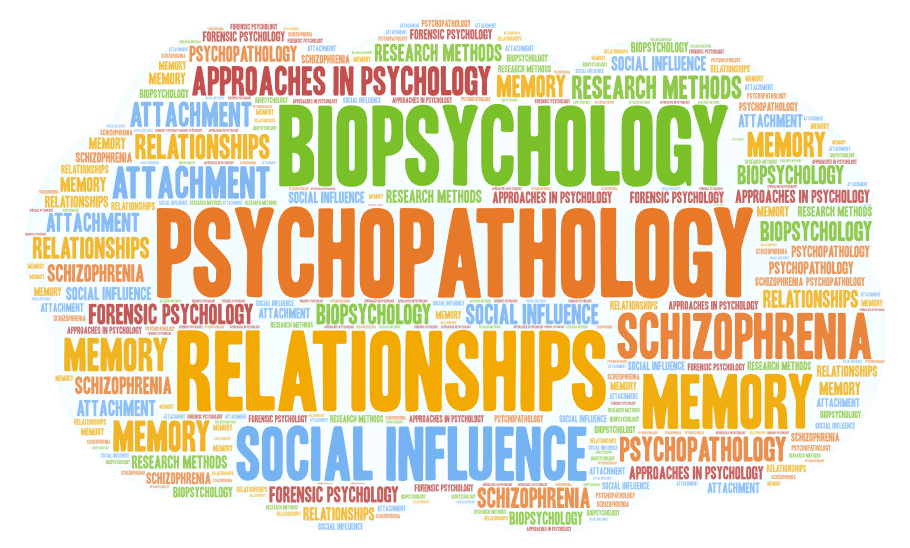
The aims of the course are:
- To investigate psychological approaches, issues, debates, theories and studies which can help to explain human behaviour.
- To support students in the application of these to a range of human behaviours.
- To develop critical thinking skills, mathematical and statistical skills, investigative skills as well as essay-writing skills.
Topics covered during the course are:
Introductory Topics in Psychology
Social Influence
Looking into conformity, obedience and how we can resist social influence and whether research into social influence explains social change.
Memory
The nature of our memory, types of long-term memory and accuracy of eyewitness testimony.
Attachment
How attachments form, different types of attachments and the quality of early attachments.
Psychopathology
Looking at behavioural, emotional and cognitive characteristics of phobias, depression and OCD.
Psychology in Context
Approaches in Psychology
Origins of psychology, how the learning, cognitive, biological, psychodynamic and humanistic approaches explain human behaviour.
Biopsychology
Looking at the nervous system and the brain, including neurons in the brain, functions of the endocrine system, brain recovery after trauma and brain scanning techniques.
Research Methods
How do psychologists investigate human behaviour? Strengths and weaknesses of research methods, how psychologists gather participants and conduct ethical research.
Issues and Debates in Psychology
Issues and debates
How the following issues and debates can be applied to theories models and research studies: gender bias, free will and determinism, nature-nurture, holism-reductionism, idiographic-nomothetic approaches, ethical implications of research studies and theories.
Relationships
Can evolutionary explanations explain partner preferences. How relationships are formed, maintained and why they break down.
Schizophrenia
How is schizophrenia diagnosed, classified, managed and treated? How do psychological explanations explain it?
Forensic Psychology
To what extent can biological and psychological explanations explain offending behaviour and how do we deal with it?
Examining Board Information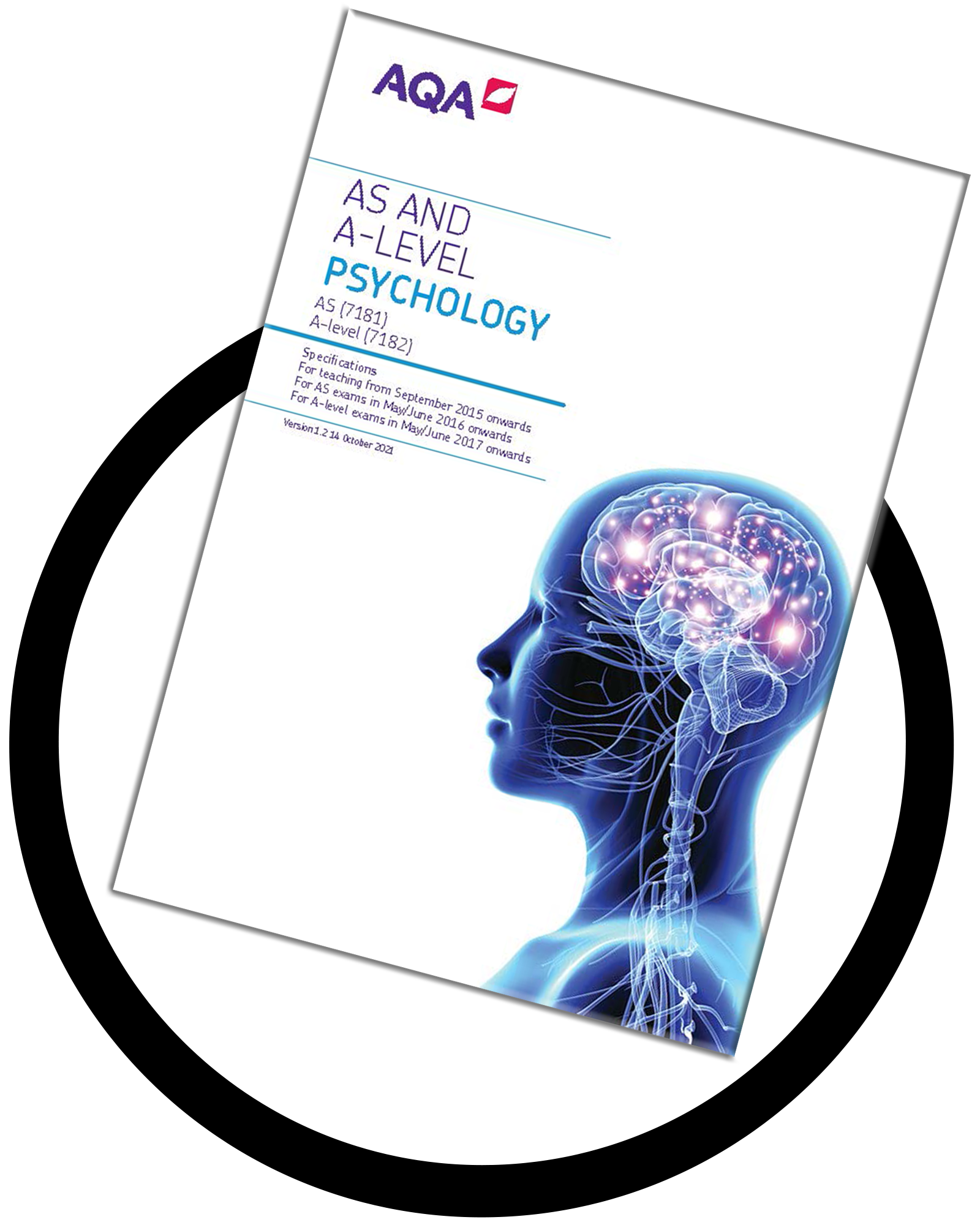
Board: AQA
Course Code: 7182
Click the image on the right to download the full course specification.
Widening Horizons
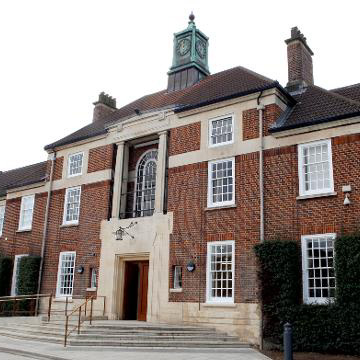
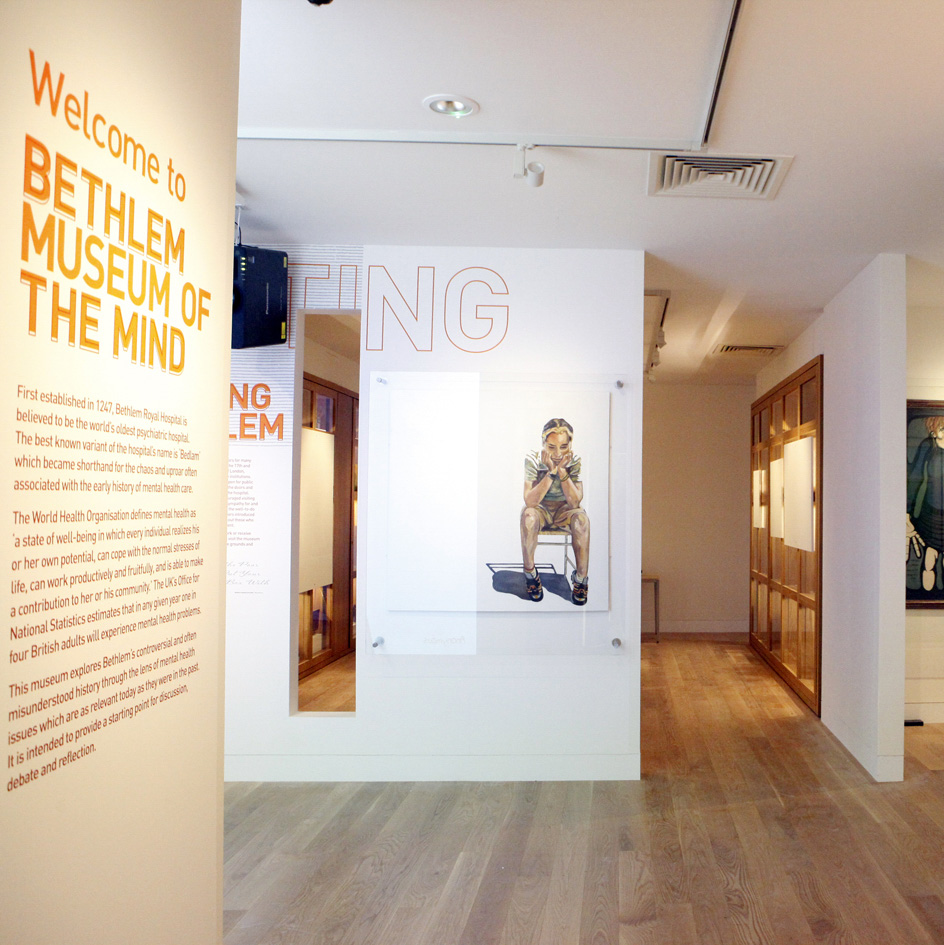
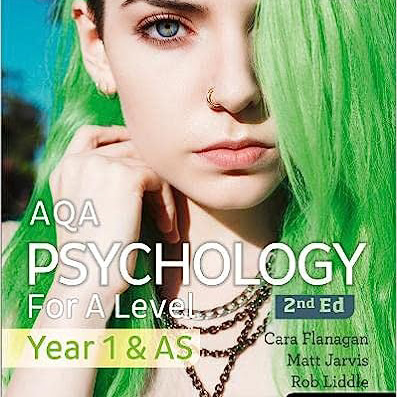
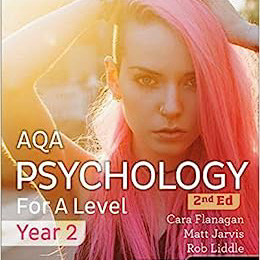
When studying Psychology, students have the opportunity to visit Bethlem Museum of the Mind in London, to explore the nineteenth-century psychiatric hospital – which was England's first mental health institution. During the visit, you will discover what it was like inside the hospital at the end of the Victorian era and whether it was really as chaotic and unpleasant as the hospital’s nickname ‘Bedlam’ suggests. You will have an ‘Inside Psychology’ experience including, a presentation about the hospital and the original floor plan – where each room is visited and photographs and more information can be obtained about the hospital and its practices. The visit will also enable you to understand the history of mental health treatment by examining past and present regimes and how the treatment of mental illness has changed substantially today with far more emphasis placed on care in the community. There will also be an opportunity to examine patient case histories, such as Mary Jane Wickham and Henry Leotine Gamlen, which will increase your awareness of the myriad of factors that can make an individual vulnerable to the development of mental illnesses such as, work, bereavement and financial worries, with the realisation that circumstances and experiences of such individuals are not so different to our own. Students will also spend time in the museum – visiting the different sections on labelling and diagnosis, freedom and constraint, temperament and recovery, and take part in a workshop based on ethics in mental health care as well as, have the opportunity to participate in a question and answer session. Visiting Bethlem’s Museum of the Mind will allow you to examine the prejudices surrounding mental illness and the stigma attached to those who suffer from it, as well as, challenge these prejudices and assumptions thus, enabling you to become more informed.
Course Resources
You will be expected to purchase a Year 1 and Year 2 course textbook - which has been endorsed by AQA.
Year 1 Authors: Cara Flanagan, Matt Jarvis and Rob Liddle
Publisher: Iluminate Publishing
ISBN-13:978-1912820429
Year 2 Authors: Cara Flanagan, Matt Jarvis and Rob Liddle
Publisher: lluminate Publishing
ISBN-13: 978-1-912820-46-7
You will also be expected to purchase a folder and dividers - in which you will place your notes, assessments, handouts, etc. This folder will be checked regularly by members of staff.
Assessment Format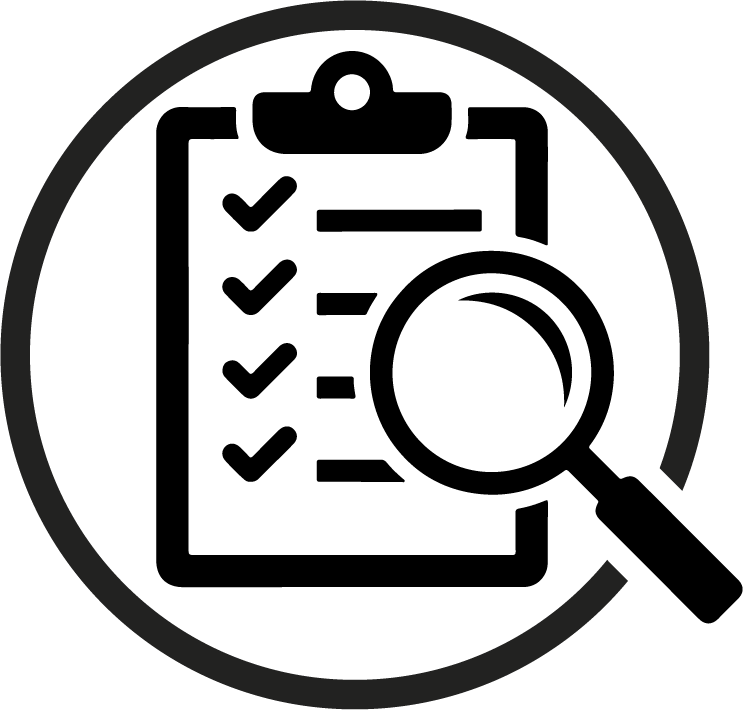
Paper 1: Introductory Topics in Psychology
Written examination (2 hrs) consisting of multiple choice, short answer and extended writing questions. This paper is worth 33.3% of the overall marks for this qualification.
Paper 2: Psychology in Context
Written examination (2 hrs) consisting of multiple choice, short answer and extended writing questions. This paper is worth 33.3% of the overall marks for this qualification.
Paper 3: Issues and Options in Psychology
Written examination (2 hrs) consisting of multiple choice, short answer and extended writing questions. This paper is worth 33.3% of the overall marks for this qualification.
Course Entry Requirements
This course requires a Grade 6 or above in GCSE English, GCSE Mathematics and a Grade 6-6 or above in GCSE Science. A grade 5-5 in GCSE Science will be considered on an exceptional basis but only if taken at the Higher Tier.
Employability Skills
Employability Skills are essential skills, personal qualities and values that will enable you to thrive in any workplace. Along with good technical understanding and subject knowledge, employers often outline a set of skills that they want from an employee.
This course will help you to develop the following employability skills:
- Analysis and evaluation of data
- Argument construction and presentation
- Evaluating material from different perspectives
- Literacy
- Numeracy
- Softer skills, such as emotional intelligence, listening to others, and teamworking
- Problem solving and perseverance
- Communication, leadership and organisation
Next Steps
Students can go on to study a variety of courses at university, including : Psychology, Criminology, other Social Sciences, Business Studies, Human Biology, Advertising & Marketing, Law, Sports Science and Forensic Science.
Possible careers include: Clinical Psychology, Occupational Psychology, Teaching, Health Service, Social Work, Business, Media, Human Resources and Physiotherapy.
10 Possible Careers
- Clinical Psychologist
- Forensic Psychologist
- Human Resources Officer
- Mental Health Nurse
- Occupational Therapist
- Police Officer
- Primary / Secondary School Teacher
- Probation Officer
- Speech & Language Therapist
- Sports & Exercise Psychologist
Student Profile: Natasha
 Natasha's subjects
Natasha's subjects
A Level English Literature
A Level Psychology,
A Level Religion, Philosophy & Ethics
Extended Project Qualification (EPQ)
I chose to attend Warlingham Sixth Form College because I was already familiar with the teachers and knew my way around the building. It is also close to where I live. I plan to study Educational Psychology at university in order to become a children’s counsellor or therapist.








